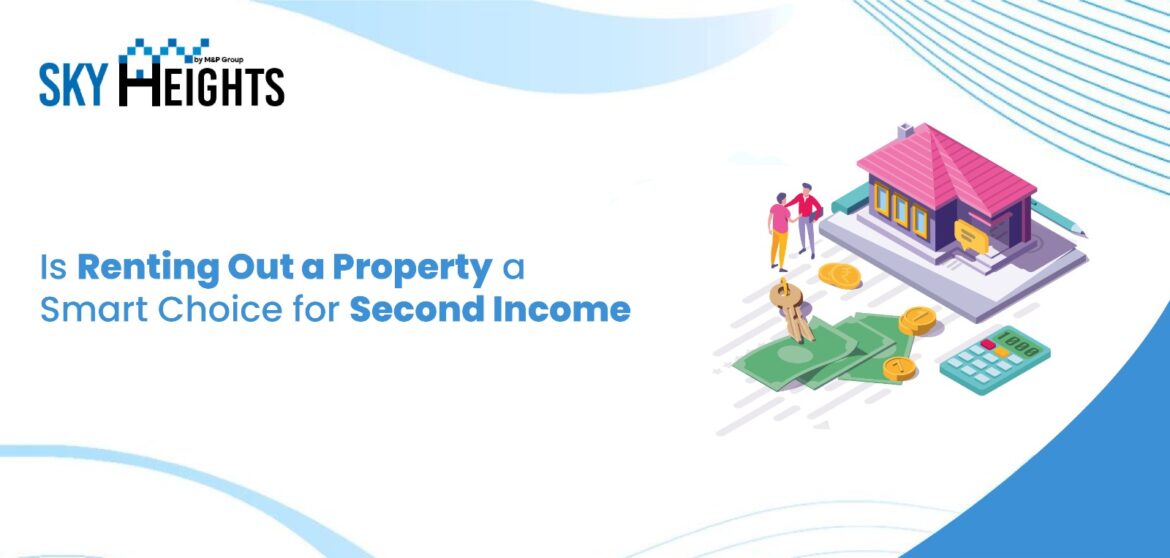Investing in a property for rental income is considered a safe and smart move to diversify the investment and a steady passive income. Well, things need to be considered before making such investments.
Investing in real estate has always been a tried and true method for building wealth and securing the financial future. In recent years, however, in the era of property development, we have witnessed a new twist, particularly in the vibrant city of Indore.
The idea of renting out a property for a second income stream has gained immense popularity among seasoned investors and individuals looking to bolster their financial security.
This innovative approach to wealth generation offers compelling advantages that are hard to ignore. Let’s delve into the world of property investment, specifically in Indore’s bustling real estate market, and explore whether it’s a savvy choice for those seeking a second income.
Why Consider Renting Out a Property for Second Income?
Renting out a property for a second income can be an attractive option for several reasons:
⦁ Financial Security: Property ownership provides a sense of financial security. Real estate tends to appreciate over time, offering a potential long-term increase in property value and backing you with its financial safety net.
⦁ Steady Passive Income: One of the primary motivations is the opportunity to generate a steady stream of passive income. Rental income can provide a regular paycheck without requiring daily involvement.
⦁ Diversification of Income: Renting out a property diversifies your income sources. Relying solely on a job or one income stream can be risky. Having rental income adds another layer of financial stability.
⦁ Property Appreciation: Properties often appreciate in value over time. While property values can fluctuate, they generally rise, especially in growing cities like Indore. This means not only are you earning rental income, but your property may also become more valuable.
⦁ Tax Benefits: In many countries, including India, there are tax benefits associated with real estate investment. You can often claim deductions on mortgage interest, property taxes, and even depreciation.
⦁ Long-Term Wealth Building: Property investment is a long-term wealth-building strategy. Over time, as you pay down the mortgage and the property value increases, you can build substantial equity.
⦁ Retirement Planning: Owning rental property can be a part of your retirement planning. It can provide a source of income during your retirement years, reducing your reliance on other retirement funds.
⦁ Local Economic Growth: Indore is experiencing significant economic growth, which can positively impact property values and rental demand. This makes it an attractive location for property investment.
⦁ Asset Diversification: Property is a tangible asset, different from stocks and bonds. Diversifying your portfolio with real estate can spread risk and improve overall investment stability.
⦁ Control over Investment: When you own rental property, you have control over how you manage it. You can make decisions about tenants, maintenance, and property improvements, giving you a sense of empowerment in your investment.
Key Considerations for Second Home Investments Rental Income Success:
1. Location
The property location is one of the most important factors to be considered. One must match the goal of investing in the property. Especially demand in that area for rent out and filter it by the daily accessible things like nearby big offices, schools, and transportation. And don’t forget about the safety and like-minded neighbourhood.
2. Budget
Getting a second home is a big deal and costs a good chunk of money. You need to be sure you know exactly how much you can spend. This includes buying the place, fixing it up if it needs it, paying to take care of it, and taxes. Make sure you can cover all these costs before you go ahead.
3. Income
You’re doing this to make some extra cash, right? So, you need to figure out how much money you can make by renting the place. Check out what other places in the area are renting for and see if that’s enough to cover all your costs and make some profit.
4. Property Management
You need to decide if you want to take care of the place yourself or if you’ll get someone to do it for you. Doing it yourself might save some money, but it’s also a lot of work. Hiring someone is easier, but it costs more.
5. Know the Rules
Before you start renting your place, you must ensure you follow all the rules. This means getting all the right legal paperwork done, making sure the place is up to mark, knowing the laws about renting in your area, and acknowledging the tenants about the terms and conditions.
In conclusion, renting out a property can indeed be a smart choice for generating a second income, but it’s a decision that should be made wisely. The potential benefits, such as additional revenue streams and potential tax advantages, make it an appealing option for many. However, careful consideration of factors like location, budget, rental income potential, property management, legal requirements, and tax implications is crucial. By addressing these aspects thoughtfully, individuals can make informed choices that not only contribute to their financial goals but also ensure a successful and rewarding venture in the world of real estate investment.


Leave a Comment